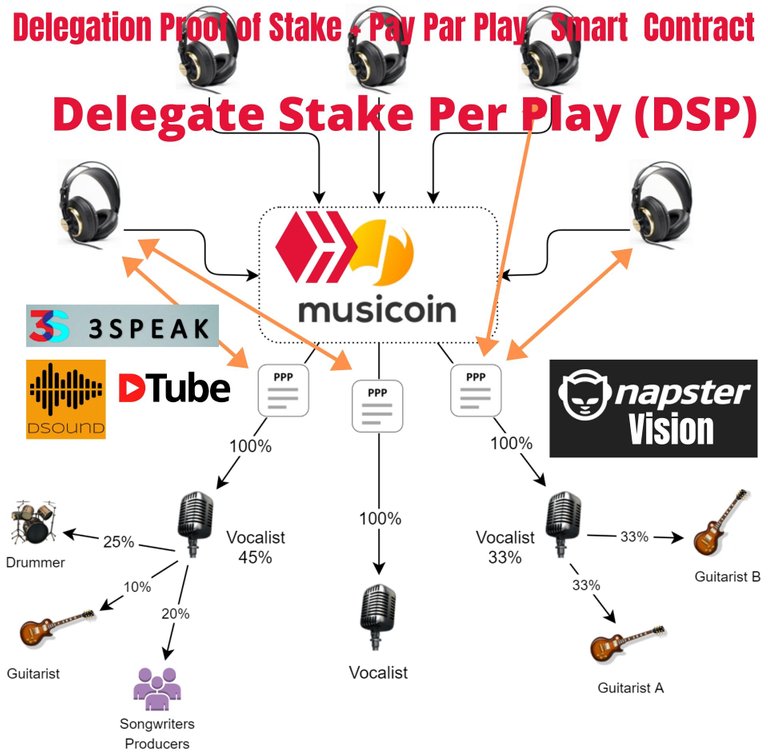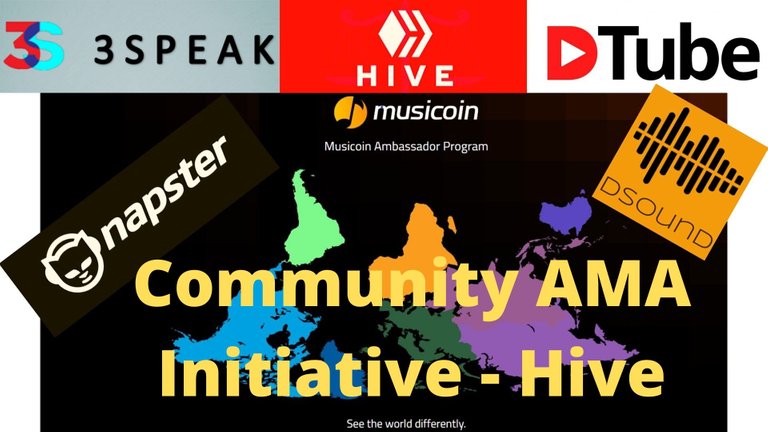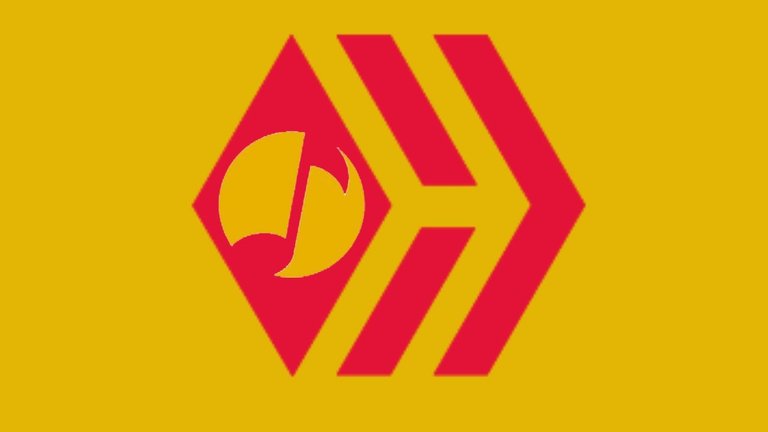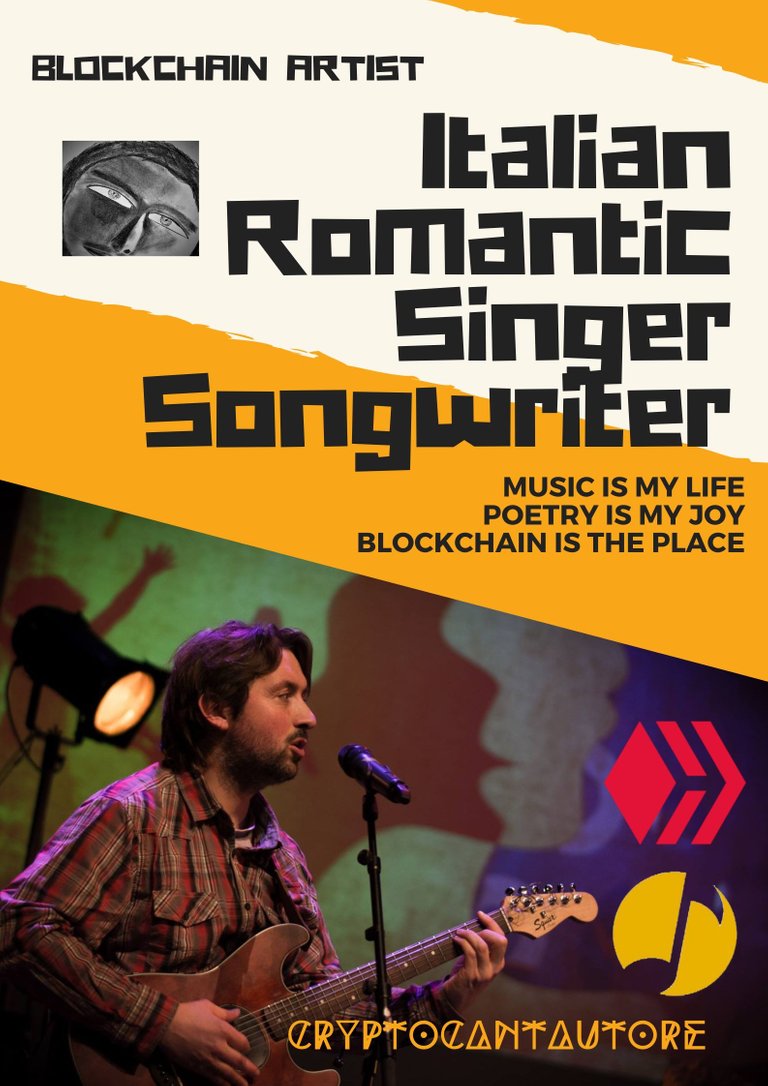COULD AN ARTIST BE A DEFI ASSET ?
The answer is yes. Sure. Since music industry was created, artist has always been a financial asset. They've always discovered great artists, signed with them contract, produced with them many songs and concerts and shared with them part of the profits. That's it.
So I decided to re-edit the first version of Musicoin whitepaper.
ABSTRACT
Hive-Musicoin is a decentralized platform that leverages the power of blockchain technology in empowering musicians to take full ownership of their content and finances. Our platform is built on a transparent Peer-to-Peer network powered by programmable smart contracts to enable fair remuneration for all musical content and services. Our long-term vision is to develop an open ecosystem where outside providers can build music related goods and services on top of the Hive-Musicoin platform. Where listeners can delegate their stake directly to artist in order to increase common earning, for both artists and listeners.
PROJECT VISION
Our vision is to establish our brand as a global music platform that provides fair remuneration, distribution, and exposure for independent musicians. Our approach in product awareness is global in scope and local in execution. This is just the beginning as we continue to iterate and build the platform in a way that is more intuitive and user-friendly to musicians, listeners and outside providers. Delegate Stake per Play streaming and Delegate Stake per Concert will be soon available.

MARKET
In recent years, the recording music industry has seen a considerable boom in
revenue due to rising digital sales. IFPI (International Federation of the Phonographic
Industry) reported an industry growth of 5.9% in revenue in 2016, the fastest rate of
growth since 1997, with a market capitalisation of $15 billion USD. The music industry is projected to achieve exponential growth and double its market capitalisation ($26 billion USD) by 2020.
Moreover, revenue streams such as streaming continue to grow with a huge upside potential, while revenue from performance rights and synchronisation remain undervalued within the industry.
THE PROBLEM FOR THE ARTISTS WAS THE SOLUTION FOR SATOSHI
The onset of the digital age in the 1980s allowed the likes of Napster to become a disruptive force in the recording industry. Peer-to-Peer file sharing allowed people to pirate content online without legal implications. This caused a huge uproar amongst musicians because they were not compensated for their work, which ultimately forced the industry to adapt and embrace streaming technology in the early 2000s.
Here from the Abstract Satoshi https://bitcoin.org/bitcoin.pdf :
Bitcoin: A Peer-to-Peer Electronic Cash System
A purely peer-to-peer version of electronic cash would allow online payments to be sent directly from one party to another without going through a financial institution. Digital signatures provide part of the solution, but the main benefits are lost if a trusted third party is still required to prevent double-spending. We propose a solution to the double-spending problem using a peer-to-peer network.The network timestamps transactions by hashing them into an ongoing chain of hash-based proof-of-work, forming a record that cannot be changed without redoing the proof-of-work.

CENTRALIZATION
Today, about 88.5% of the global music industry is largely dominated by three multinational record labels: Universal Music Group, Sony Music Entertainment, and Warner Music Group.
These record label companies (with sub-labels and publishing companies as subsidiaries) oversee most of the music distribution. Because of such market monopoly, they are in a position to dictate market rules that are most favorable to them. They often enforce unfair contracts in negotiations with streaming services, receive large advances and bargain for minimum payment and ownership positions
under non-disclosure agreements. Centralization of revenue and power among music producers and publishers has also led to egregious abuse of nascent centralized streaming platforms. For example, recently Sony Music threatened to withdraw all its content from Pandora, claiming that the royalty rates were too low.

HIVE-MUSICOIN : DELEGATE STAKE PER PLAY
Delegate Stake Per Play (DSP) smart contract is the first of its kind in the cryptocurrency space and is designed exclusively with the interests of musicians in mind. All musicians on our platform retain full ownership of their content, and are rewarded fairly and automatically through autonomous smart contracts. It brings a new level of transparency and clarity to the music industry that is plagued by complex and obtuse licensing contracts.
Our DSP smart contract aligns with a musician’s intuitive expectation of a payout, from each single stream of their content. DSP is a smart contract on the Musicoin blockchain that enforces and executes licensing terms to reward a certain fixed amount of $HIVE and $MUSIC (native currency of the Musicoin platform) per playback. Within seconds, the payment goes out directly to the owner of the license for that musical work. No intermediaries are required to facilitate payments other than the ledger of the Musicoin
Moreover, the DPS smart contract can be designed to execute immediate split of revenue to several beneficiaries. For example, a DSP contract of a license for a four-person band can enforce a split payout of 45% to the main musician, 20% to the songwriters and producers, 10% to the guitarist and 25% to the drummer. The use of this contract allows us to avoid unnecessary costs in content acquisition by removing all middle-men involved and thereby distribute 100% of the earnings to the musicians.
Moreover, listener could even participate with their stake to capitalise the
HIVE-MUSICOIN : DELEGATE STAKE PER CONCERT
Or all other feature artists can provide to their listeners, like : web concert, house concert, music lessons, showcases, use artist music for all other listener needs and so on.
Conclusion
We would like to propose a system for delegate stake to artist and allow listener to participate to the music industry starting from Indie Artist.
